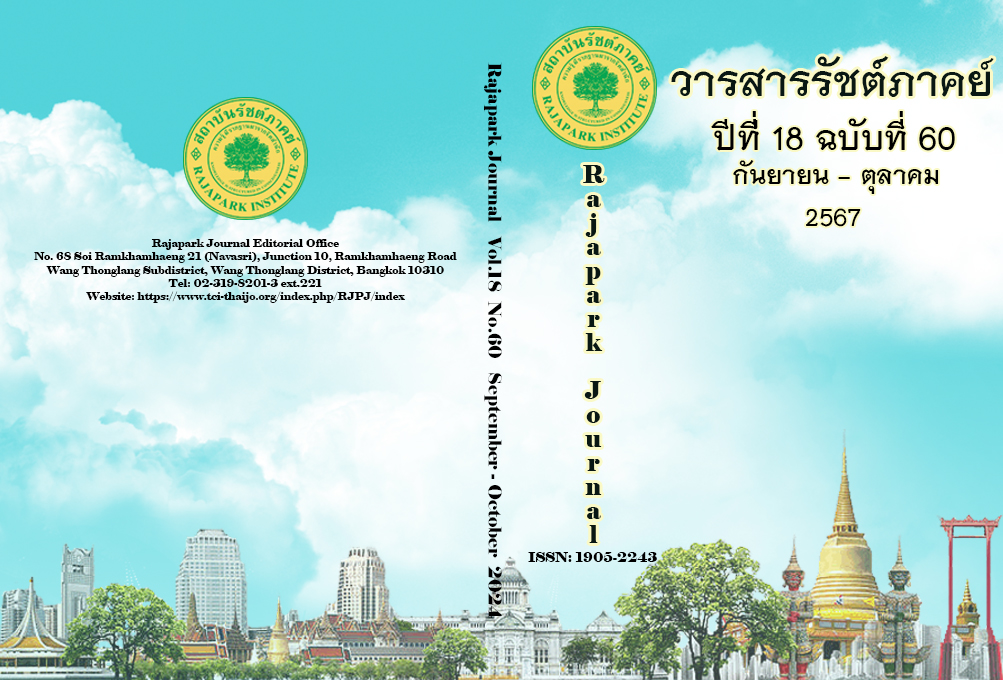Immediate Action Required: Legal Measures for Occupations Changed from the COVID-19 Pandemic
Main Article Content
Abstract
This comprehensive study aimed to investigate 1) the types of jobs during a COVID-19 pandemic in Thailand, 2) the factors associated with altering types of occupations during a COVID-19 pandemic, and 3) the government welfare benefits offered after informal workers’ employment changed. This quantitative study collected data through a questionnaire using purposive sampling. The quantitative data were analyzed using descriptive statistics, including frequency, percentage, and mean and inferential statistics. The research also raises questions regarding domestic and international laws, regulations, and measures related to informal workers. The survey discovered that the sample’s average age was 29 years, and over one-third were now unemployed. Many in the sample group who had jobs before the epidemic became unemployed and no longer working (69.4%). Regarding occupational patterns, older persons are less likely to change careers since they have more job security, work experience, and the ability to adjust to changing circumstances. Meanwhile, younger people, or the new generation, are more inclined to choose jobs that match their interests. Regarding work careers, it was discovered that people with no job limits and who could explore extra employment were more likely to modify their career patterns. The COVID-19 pandemic has significantly impacted the working-age population, particularly those working in the informal sector, because they have no employer or social protection. As a result, these workforce groups continue to require more excellent government help than others. As a result, the government should extensively promote knowledge of benefits to the working population, particularly in informal sectors, because welfare rights are essential to them. Currently, no law explicitly supports this.
Article Details

This work is licensed under a Creative Commons Attribution-NonCommercial-NoDerivatives 4.0 International License.
Views and opinions appearing in the Journal it is the responsibility of the author of the article, and does not constitute the view and responsibility of the editorial team.
References
Cohen, J. (1992). A power primer. Psychological Bulletin, 112(1), 155–159. https://doi.org/10.1037/0033-2909.112.1.155
Chalamwong, Y. et al. (2021, April 29). The impact of the second and third waves of COVID-19 outbreaks on the direction of the Thai labor market. Thailand Development Research Institute: TDRI. https://tdri.or.th/2021/04/covid-19-2-3-affected-thai-labor-market/
Cochran, W.G. (1977). Sampling Techniques (3rd ed.). John Wiley & Sons.
Electronic Transactions Development Agency (ETDA). (2021, June 10). Thai e-commerce after COVID-19. https://www.etda.or.th/th/Useful-Resource/Knowledge-Sharing/Perspective-on-Future-of-e-Commerce.aspx
Poojanjob, R. (2022). The influence of adaptation from the impact of COVID-19 that affect the quality of life of informal workers in Mueang District, Songkhla Province. School of Administrative Studies Academic Journal, 5(2), 2-18. https://so05.tci-thaijo.org/index.php/SASAJ/article/view/256897
The Senate Newsletter. (2022, June). Promotion of quality of life development and protection of informal workers. In Column: Interesting Laws (pp. 17-20). https://www.senate.go.th/assets/portals/93/fileups/253/files/Analysis/65/06_65_1.pdf
Yamane, T. (1973). Statistics: An introductory analysis (3rd ed.). Harper & Row.


